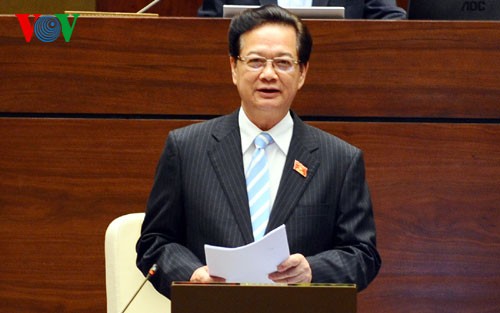(VOVworld) – The National Assembly Q and A session ended on Wednesday by hearing from Prime Minister Nguyen Tan Dung. Regarding public debt, he said, due to the impact of the global economic recession, Vietnam’s economic recovery had slowed in recent years.
 |
While budget collection has had to be reduced to remove obstacles to businesses, spending on social security, salary rises, national defense and security, and debt payments still needed to be ensured. Consequently, to achieve its socio-economic targets, Vietnam needed to borrow more money leading to increased public debts, which is expected to be 64% by the end of next year. This level remains within safe limits but still can cause national financial instability. Prime Minister Dung elaborated on measures in the years to come: “The government will tighten the control of public debts, particularly new loans so that by 2020 public debts will reduce to 60.2%. Control of other debts in capital construction, social insurance, and state-owned businesses will also be tightened. Public debts are used only for development investment and the building of important facilities. It’s crucial to increase inspections of the use of loans to prevent and punish violations as well as to restructure public debts. The government will instruct the State Bank of Vietnam to increase the management of short-term loans to credit organizations to ensure that from 2015 payments will be within the set limit, which is under 25% of the annual import-export revenue.”
The Prime Minister said the government will not use the state budget to resolve bad debts. The government will continue to fine-tune the legal framework, increase inspections and the supervision of bad debts, develop the securities and property markets with the aim of reducing the bad debt rate to 3% to ensure the structure of credit organizations.
Answering deputies’ questions concerning the development of the marine economy, he said the Party had issued a resolution on marine strategy and the government has devised action programs to implement the strategy. He talked about Vietnam’s foreign policy in the context of the East Sea situation: “We are consistent with the Party and state’s foreign policy with all other countries. Vietnam always hopes that China will cooperate for mutual development and benefit and to resolve maritime border disputes in line with international law and the agreements reached between the two countries’ leaders. We are cooperating and struggling to achieve peace, stability, friendship, mutual trust and to defend our national independence, sovereignty, and legitimate interests. China’s transformation of some islands in the Truong Sa archipelago has violated Article 5 of the Declaration on the Conduct of Parties in the East Sea (DOC). Vietnam rejects’ China’s acts and has voiced its objection at many recent international conferences.”
The Prime Minister also mentioned measures to achieve rapid and sustainable poverty reduction in ethnic areas, develop key economic regions, and improve vocational training.
In his closing speech, National Assembly Chairman Nguyen Sinh Hung said the Q and A session had received positive feedback from voters and deputies, demonstrating the government’s determination to achieve the targets set by the National Assembly. He also asked the questioned ministers to implement their commitments and report their actions at the next session.